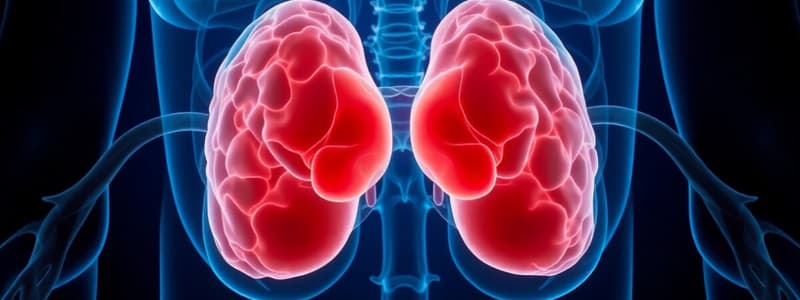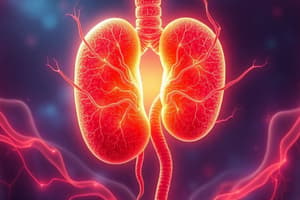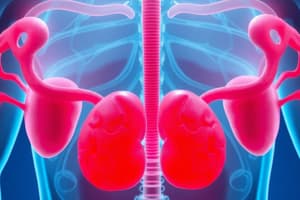Podcast
Questions and Answers
What is a primary cause of acute adrenal insufficiency?
What is a primary cause of acute adrenal insufficiency?
- Regular intense exercise
- Abrupt stop of steroids (correct)
- Continuous high-dose steroid therapy
- Low dietary sodium intake
Which of the following interventions is important when monitoring a patient with acute adrenal insufficiency?
Which of the following interventions is important when monitoring a patient with acute adrenal insufficiency?
- Monitor I&Os (correct)
- Avoid all dietary changes
- Limit fluid intake to prevent overload
- Daily exercise regimen
What treatment is administered rapidly for acute adrenal insufficiency?
What treatment is administered rapidly for acute adrenal insufficiency?
- IV steroids, saline fluids, and sugar (correct)
- Oral antibiotics
- Topical corticosteroids
- Oral antihistamines
Which dietary change should be made to manage potassium levels in a patient with acute adrenal insufficiency?
Which dietary change should be made to manage potassium levels in a patient with acute adrenal insufficiency?
What should a patient with adrenal insufficiency do in case of an emergency?
What should a patient with adrenal insufficiency do in case of an emergency?
Which medication is typically used to prevent stress ulcers in patients with acute adrenal insufficiency?
Which medication is typically used to prevent stress ulcers in patients with acute adrenal insufficiency?
What cardiovascular effect should one be cautious about when administering steroids?
What cardiovascular effect should one be cautious about when administering steroids?
Which vital signs monitoring frequency is appropriate for a patient with acute adrenal insufficiency?
Which vital signs monitoring frequency is appropriate for a patient with acute adrenal insufficiency?
What should be monitored for as potential signs of meningitis?
What should be monitored for as potential signs of meningitis?
What is a recommended action to prevent complications after surgery?
What is a recommended action to prevent complications after surgery?
Which hormone is primarily responsible for growth in muscles and bones during adolescence?
Which hormone is primarily responsible for growth in muscles and bones during adolescence?
What is one of the key aspects of post-operative care regarding oral hygiene?
What is one of the key aspects of post-operative care regarding oral hygiene?
How should patients after surgery manage increased intracranial pressure (ICP)?
How should patients after surgery manage increased intracranial pressure (ICP)?
What is a normal post-operative observation regarding nasal discharge?
What is a normal post-operative observation regarding nasal discharge?
What should patients be educated about regarding lifelong hormone therapy?
What should patients be educated about regarding lifelong hormone therapy?
What role does IGF-1 play in the body concerning growth?
What role does IGF-1 play in the body concerning growth?
What condition is characterized by decreased bone density, increased visceral fat mass, and increased cholesterol due to low IGF-1 levels?
What condition is characterized by decreased bone density, increased visceral fat mass, and increased cholesterol due to low IGF-1 levels?
Which symptom is NOT associated with hyperprolactinemia?
Which symptom is NOT associated with hyperprolactinemia?
What is a common treatment option for acromegaly?
What is a common treatment option for acromegaly?
Which of the following is NOT a symptom of acromegaly?
Which of the following is NOT a symptom of acromegaly?
What effect does Human Growth Hormone (HGH) have when administered?
What effect does Human Growth Hormone (HGH) have when administered?
In the context of hypopituitarism, what effect is NOT observed in children?
In the context of hypopituitarism, what effect is NOT observed in children?
What hormone can block prolactin production?
What hormone can block prolactin production?
Which hormone levels are typically used to diagnose GH-related disorders?
Which hormone levels are typically used to diagnose GH-related disorders?
Which of the following is a side effect of Human Growth Hormone (HGH) therapy?
Which of the following is a side effect of Human Growth Hormone (HGH) therapy?
What physical change is associated with gigantism in children?
What physical change is associated with gigantism in children?
What is a critical precaution to take after a thyroidectomy?
What is a critical precaution to take after a thyroidectomy?
What is the most critical complication following a thyroidectomy?
What is the most critical complication following a thyroidectomy?
Which medication is considered first line for treating thyroid storm?
Which medication is considered first line for treating thyroid storm?
What should be monitored closely postoperatively for signs of complications?
What should be monitored closely postoperatively for signs of complications?
What lifestyle change is necessary after a total thyroidectomy?
What lifestyle change is necessary after a total thyroidectomy?
Which symptom is indicative of potential tracheal compression after a thyroidectomy?
Which symptom is indicative of potential tracheal compression after a thyroidectomy?
What should be done immediately if signs of a thyroid storm appear?
What should be done immediately if signs of a thyroid storm appear?
Which of the following should NOT be used in cooling measures for a patient in thyroid storm?
Which of the following should NOT be used in cooling measures for a patient in thyroid storm?
Which of the following medications is considered the first-line treatment for hyperthyroidism?
Which of the following medications is considered the first-line treatment for hyperthyroidism?
What is a common symptom associated with Graves disease?
What is a common symptom associated with Graves disease?
What is the primary function of T3 and T4 hormones in the body?
What is the primary function of T3 and T4 hormones in the body?
Which hormone is primarily responsible for stimulating the thyroid gland?
Which hormone is primarily responsible for stimulating the thyroid gland?
What is the role of potassium iodide (SSKI) in the treatment of hyperthyroidism?
What is the role of potassium iodide (SSKI) in the treatment of hyperthyroidism?
Which condition could lead to secondary hyperthyroidism?
Which condition could lead to secondary hyperthyroidism?
What is a key distinguishing feature of hyperthyroidism related to metabolic changes?
What is a key distinguishing feature of hyperthyroidism related to metabolic changes?
Which of the following is a common assessment finding in a patient with hyperthyroidism?
Which of the following is a common assessment finding in a patient with hyperthyroidism?
How long should anti-thyroid medications generally be taken before tapering off?
How long should anti-thyroid medications generally be taken before tapering off?
Which of the following is NOT a side effect of Methimazole?
Which of the following is NOT a side effect of Methimazole?
Which medication is known as 'Puts Thyroid Underground'?
Which medication is known as 'Puts Thyroid Underground'?
What is the primary purpose of radioactive iodine therapy in treating hyperthyroidism?
What is the primary purpose of radioactive iodine therapy in treating hyperthyroidism?
Which of the following dietary recommendations is suggested for patients with hyperthyroidism?
Which of the following dietary recommendations is suggested for patients with hyperthyroidism?
What is the primary cause of Cushing Disease?
What is the primary cause of Cushing Disease?
Which condition is most commonly associated with exogenous Cushing Syndrome?
Which condition is most commonly associated with exogenous Cushing Syndrome?
What would be an expected result in an ACTH plasma level test for a patient with Cushing Disease?
What would be an expected result in an ACTH plasma level test for a patient with Cushing Disease?
What is a common psychosocial assessment observation in Cushing Disease patients?
What is a common psychosocial assessment observation in Cushing Disease patients?
In the treatment of Cushing Syndrome due to exogenous sources, what intervention is crucial?
In the treatment of Cushing Syndrome due to exogenous sources, what intervention is crucial?
What surgical procedure is typically performed for hyperaldosteronism?
What surgical procedure is typically performed for hyperaldosteronism?
What assessment finding is expected in a patient with hypokalemia related to hyperaldosteronism?
What assessment finding is expected in a patient with hypokalemia related to hyperaldosteronism?
Which medication is commonly used to treat central Diabetes Insipidus?
Which medication is commonly used to treat central Diabetes Insipidus?
What is a distinguishing feature of Syndrome of Inappropriate Antidiuretic Hormone (SIADH)?
What is a distinguishing feature of Syndrome of Inappropriate Antidiuretic Hormone (SIADH)?
What is a primary symptom of diabetes insipidus related to low ADH levels?
What is a primary symptom of diabetes insipidus related to low ADH levels?
Which of the following best describes hypopituitarism?
Which of the following best describes hypopituitarism?
What is a critical assessment finding for a patient experiencing adrenal crisis post adrenalectomy?
What is a critical assessment finding for a patient experiencing adrenal crisis post adrenalectomy?
In the context of Cushing's Disease, easy bruising is likely due to which physiological change?
In the context of Cushing's Disease, easy bruising is likely due to which physiological change?
Flashcards
Acute Adrenal Insufficiency
Acute Adrenal Insufficiency
A medical condition where the body cannot produce enough cortisol and aldosterone, often due to stress, abrupt steroid cessation, or severe drops in blood pressure or sugar.
Causes of Acute Adrenal Insufficiency
Causes of Acute Adrenal Insufficiency
High stress, abrupt steroid withdrawal, hypotension (low blood pressure), and low blood sugar.
Treatment for Acute Adrenal Insufficiency
Treatment for Acute Adrenal Insufficiency
Rapid intravenous administration of steroids, fluids (saline), and sugar.
Monitoring for Acute Adrenal Insufficiency
Monitoring for Acute Adrenal Insufficiency
Signup and view all the flashcards
Arrhythmia Management
Arrhythmia Management
Signup and view all the flashcards
Nursing Education: Adrenal Insufficiency
Nursing Education: Adrenal Insufficiency
Signup and view all the flashcards
Home Steroid Use
Home Steroid Use
Signup and view all the flashcards
Adrenal Hyperfunction
Adrenal Hyperfunction
Signup and view all the flashcards
Meningitis Signs
Meningitis Signs
Signup and view all the flashcards
Post-Op Nasal Care
Post-Op Nasal Care
Signup and view all the flashcards
What does GH affect?
What does GH affect?
Signup and view all the flashcards
What does GH trigger?
What does GH trigger?
Signup and view all the flashcards
GH and Cell Lifespan
GH and Cell Lifespan
Signup and view all the flashcards
GH's Overall Effect
GH's Overall Effect
Signup and view all the flashcards
Hormone Replacement Therapy
Hormone Replacement Therapy
Signup and view all the flashcards
Actions to Avoid After Surgery
Actions to Avoid After Surgery
Signup and view all the flashcards
GH's Role in Fat Breakdown
GH's Role in Fat Breakdown
Signup and view all the flashcards
Growth Hormone Deficiency (Hypo)
Growth Hormone Deficiency (Hypo)
Signup and view all the flashcards
Growth Hormone Deficiency in Children
Growth Hormone Deficiency in Children
Signup and view all the flashcards
Growth Hormone Excess (Hyper)
Growth Hormone Excess (Hyper)
Signup and view all the flashcards
Acromegaly
Acromegaly
Signup and view all the flashcards
Prolactin Deficiency (Hypo)
Prolactin Deficiency (Hypo)
Signup and view all the flashcards
Prolactin Excess (Hyper)
Prolactin Excess (Hyper)
Signup and view all the flashcards
Octreotide (Sandostatin)
Octreotide (Sandostatin)
Signup and view all the flashcards
Pegivsomant (Somavert)
Pegivsomant (Somavert)
Signup and view all the flashcards
Surgery for Gigantism
Surgery for Gigantism
Signup and view all the flashcards
Cushing Syndrome (Exogenous)
Cushing Syndrome (Exogenous)
Signup and view all the flashcards
Cushing Disease (Endogenous)
Cushing Disease (Endogenous)
Signup and view all the flashcards
Risk Factor (Cushing Disease)
Risk Factor (Cushing Disease)
Signup and view all the flashcards
Cushing Disease Assessment (History)
Cushing Disease Assessment (History)
Signup and view all the flashcards
Hyperaldosteronism (Primary Conn's Syndrome)
Hyperaldosteronism (Primary Conn's Syndrome)
Signup and view all the flashcards
Hypokalemia
Hypokalemia
Signup and view all the flashcards
Hypernatremia
Hypernatremia
Signup and view all the flashcards
Diabetes Insipidus (DI) Central
Diabetes Insipidus (DI) Central
Signup and view all the flashcards
Diabetes Insipidus (DI) Nephrogenic
Diabetes Insipidus (DI) Nephrogenic
Signup and view all the flashcards
SIADH (Syndrome of Inappropriate ADH)
SIADH (Syndrome of Inappropriate ADH)
Signup and view all the flashcards
Post-hypophysectomy Care
Post-hypophysectomy Care
Signup and view all the flashcards
Hyperaldosteronism (Secondary)
Hyperaldosteronism (Secondary)
Signup and view all the flashcards
DI Treatment
DI Treatment
Signup and view all the flashcards
SIADH Treatment
SIADH Treatment
Signup and view all the flashcards
Hypopituitarism
Hypopituitarism
Signup and view all the flashcards
Thyroidectomy Pre-Op
Thyroidectomy Pre-Op
Signup and view all the flashcards
Thyroidectomy Post-Op
Thyroidectomy Post-Op
Signup and view all the flashcards
Tracheal Compression
Tracheal Compression
Signup and view all the flashcards
Hypocalcemia after Thyroidectomy
Hypocalcemia after Thyroidectomy
Signup and view all the flashcards
Thyroid Storm
Thyroid Storm
Signup and view all the flashcards
Thyroid Storm Treatment (1st Line)
Thyroid Storm Treatment (1st Line)
Signup and view all the flashcards
Thyroid Storm Treatment (Supportive)
Thyroid Storm Treatment (Supportive)
Signup and view all the flashcards
Lifelong Hormone Replacement
Lifelong Hormone Replacement
Signup and view all the flashcards
Hyperthyroidism
Hyperthyroidism
Signup and view all the flashcards
Graves' Disease
Graves' Disease
Signup and view all the flashcards
Toxic Nodular Goiter
Toxic Nodular Goiter
Signup and view all the flashcards
Thyroiditis
Thyroiditis
Signup and view all the flashcards
Exogenous Hyperthyroidism
Exogenous Hyperthyroidism
Signup and view all the flashcards
Primary Hyperthyroidism
Primary Hyperthyroidism
Signup and view all the flashcards
Secondary Hyperthyroidism
Secondary Hyperthyroidism
Signup and view all the flashcards
Hyperthyroidism Assessment
Hyperthyroidism Assessment
Signup and view all the flashcards
Hyperthyroidism Diagnostics
Hyperthyroidism Diagnostics
Signup and view all the flashcards
Graves' Disease Signs
Graves' Disease Signs
Signup and view all the flashcards
Methimazole
Methimazole
Signup and view all the flashcards
Propylthiouracil (PTU)
Propylthiouracil (PTU)
Signup and view all the flashcards
Potassium Iodide (SSKI)
Potassium Iodide (SSKI)
Signup and view all the flashcards
Beta Blockers (Propranolol)
Beta Blockers (Propranolol)
Signup and view all the flashcards
Radioactive Iodine Therapy
Radioactive Iodine Therapy
Signup and view all the flashcards
Study Notes
Adrenal Gland Problems
- Adrenal glands have two parts: medulla (inner) and cortex (outer)
- Medulla produces catecholamines (epinephrine, norepinephrine)
- Cortex produces three main types of hormones:
- Mineralocorticoids (e.g., aldosterone): regulate fluid volume, sodium reabsorption, and potassium excretion
- Glucocorticoids (e.g., cortisol): regulate blood glucose, inflammatory responses
- Androgens: responsible for sex characteristics
Adrenal Cortex: Mineralocorticoids (Aldosterone)
- Regulates extracellular fluid volume
- Causes sodium reabsorption and water reabsorption
- Causes potassium loss/excretion
Adrenal Cortex: Glucocorticoids (Cortisol)
- Secreted in response to the release of corticotropin releasing hormone (CRH) from the hypothalamus
- Increases blood glucose levels due to gluconeogenesis in the liver
- Regulates blood pressure by causing vasoconstriction and increasing glomerular filtration rate
- Influences emotional stability and alertness
Adrenal Cortex: Sex Hormones
- Androgens: involved in male and female traits, essential for puberty
- Adrenal medulla is center of adrenal gland, responsible for the "fight or flight" response
- Norepinephrine
- Epinephrine
Adrenal Dysfunction: Hypofunction
- Inadequate secretion of hormones from the hypothalamus and anterior pituitary
- Adrenal cortex is affected, leading to a decrease in glucocorticoids and mineralocorticoids
- Adrenalectomy is the surgical removal of the adrenal gland(s)
Adrenal Dysfunction: Hyperfunction
- (Conn's syndrome): excess aldosterone secretion
- Most common cause is an adrenal adenoma (benign tumor)
- Also caused by chronic kidney disease (CKD) and a tumor secreting renin, which triggers aldosterone production
- Clinical manifestations:
- Hypernatremia
- Hypokalemia
Cushing's Disease
- Too much cortisol, often due to a pituitary tumor secreting ACTH (most common cause)
- Risks factors: 25-40 years old, females 5 times more likely
- Symptoms:
- Increased appetite
- Weight gain (central obesity)
- Changes in sleep patterns
- Easy bruising
- Assessment:
- History questioning appetite changes, sleep problems, bruising tendencies
- Physical exam: looking for weight gain and central obesity
- Diagnosis:
- Blood tests to look for cortisol levels
- Imaging studies like CT/MRI
Addison's Disease
- Chronic condition, often autoimmune, leading to insufficient cortisol and aldosterone production
- Risk factors: most commonly autoimmune, TB, HIV are additional causes
- Symptoms:
- Weight loss
- Fatigue
- Increased craving for salt
- Low blood pressure
- Muscle weakness
- Low blood sugar
- Abdominal pain
Studying That Suits You
Use AI to generate personalized quizzes and flashcards to suit your learning preferences.




